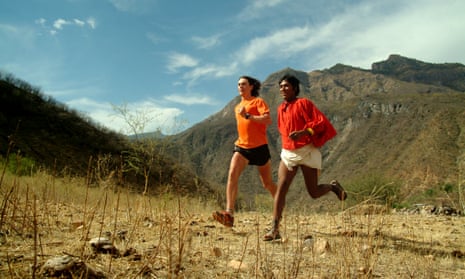Next up in ESPN’s venerable 30 for 30 series is The Infinite Race, a documentary on a sports topic that hardly checks the biggest 30 for 30 box, in that the film does not involve a famous star athlete, sport or event. In fact, The Infinite Race kicks off with a simple story about an indigenous people’s joy of long-distance running.
The documentary explores what happens to these people, the Tarahumara, who live deep in the mountains of Chihuahua, Mexico, when their love of running, or even their calling to run, spills out to the rest of the world because of a popular book about running and an American known as Caballo Blanco, or the White Horse.
“It’s a story about resilience, survival and continuance,” Bernardo Ruiz, the veteran Mexican and American film-maker who directed The Infinite Race, tells the Guardian.
That the 50-mile Ultra Maratón Caballo Blanco, which The Infinite Race revolves around, will be held again next March in the rugged terrain of Chihuahua’s Copper Canyon is a testament to the event’s durability. Running won out, as it has for generations among the Tarahumara, but only after the event survived a culture clash that involved a lot of dollars and pesos, good and bad.
Although he directed an award-winning 2008 documentary about baseball star Roberto Clemente and says he always wanted to make a film about running, Ruiz deals with tougher subjects, like the US-Mexico drug war in his 2016 documentary Kingdom of Shadows.
He says of The Infinite Race: “I liked how it was a compelling, beautiful film about running, but it also talked about social issues.”
The film, which debuts on 15 December, starts a little slowly, but those who stick with it will find out much about an indigenous people’s rich past – and a future lighted by hope.
The Tarahumara, or the Rarámuri, have run vast distances for years, often wearing sandals that have tire treads as soles. They say running is in their blood: isolation and geography helped them build endurance to hunt prey. They became famous after they were featured in Born to Run, a 2009 bestseller by Christopher McDougall.
The central figure of Born to Run was American ultramarathon runner Micah True, also known as Caballo Blanco, who organized a race in 2003 that would eventually become the Ultra Maratón Caballo Blanco. True hoped the race would help the Tarahumara preserve their running heritage and, more significantly, their culture, which had been battered by hunger, a lack of drinking water, a shortage of housing and global heating.
True, who had wintered in the area for 10 years, offered prizes of cash and corn, a commodity: “I don’t want to see people kill themselves for corn,” he said in the documentary. He opened the event to ultramarathoners, and it became popular among Americans, who were looking for a new challenge and a new culture to explore.
True died in 2012 at the age of 58 of a heart attack while running, but the event named after him continued to grow. A shorter kids’ run for “Caballitos” was offered, with bags of school supplies given to participants. The event had become commercialized, even with its own line of merchandise, but the whole region benefited from Caballo Blanco’s idea.
But the region’s seclusion had also become attractive to criminal gangs, who took over farms to grow marijuana and poppy plants to smuggle into the United States, whose border is only about 550 miles to the north. People needed work, and the drug trade provided opportunities, with even distance runners hauling drugs. Gangs proliferated. So did violence.
“Many families were forced out of their communities because of the violence,” Irma Chávez, an activist, explains in the film. “Unfortunately, you have to run away before they kill you.”
The 2015 Ultra Maratón Caballo Blanco was supposed to be the biggest yet, but gangs all but took over the town, clouding the event with the real threat of violence. The Americans who helped organize the race, believing participants could be in danger, decided almost at the last minute to call off the official race. No vouchers for corn would be issued to participants.
“They kind of intruded with a heavy hand into a runner’s paradise,” Ruiz says of the gangs.
He says, “It’s been my view that the race organizers were stuck in kind of an impossible situation.”
And that might have been the end of the event. But a group of Tarahumara assembled on what was supposed to be the morning of the race – and ran the course anyway, without incident. The marathon was officially back in 2017. Miguel Lara Viniegras won the 2020 race, which attracted 220 runners last March, in six hours 43 minutes.
As an ultrarunner and photographer Luis Escobar says in the film, “People are looking for something big, outside of their office, outside of their home. It is a big struggle, it’s hard physically and mentally – and there’s nothing like doing it. When you complete it, you know that you can do anything.”
Ruiz, who says he spent most of his career examining the love-hate relationship between the United States and Mexico, had a compelling challenge: telling a story that was not that well-known and based in a place that was very difficult to get to from the outside world. “You’d have to kind of be an ultrarunner or a sports geek to care about it,” he says.
Perhaps the film won’t draw as big an audience as other ESPN documentaries because it does not include an American sports celebrity like OJ Simpson or Michael Jordan. But the 30 for 30 project, now more than a decade old, has become much deeper, delivering quality projects that are way more than mere sports movies. This is one.
As Ruiz says, 30 for 30 “is a franchise that is really film-maker-driven.”










